Mollie Hemingway says the 2020 election ‘went terribly wrong’. In a divided America, her deeply flawed book will find readers
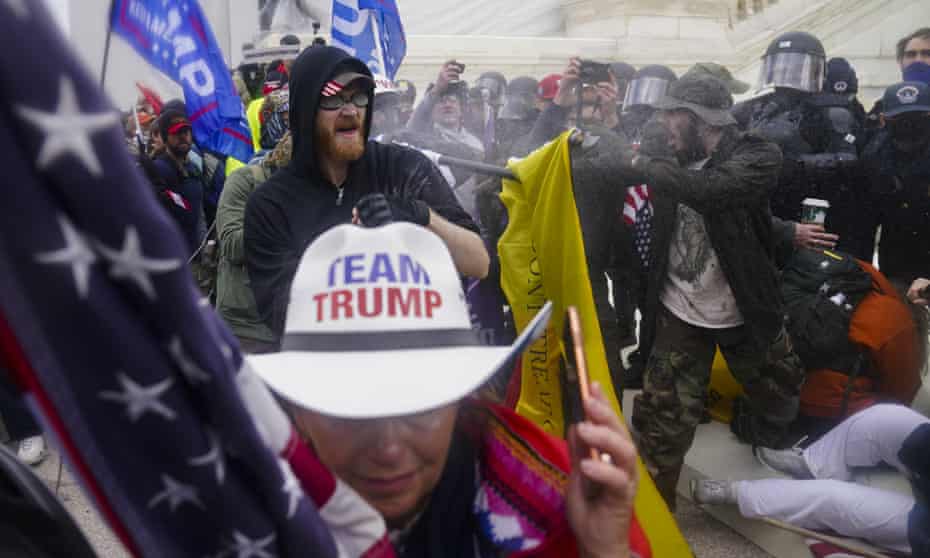
Rioters try to break through a police barrier at the Capitol in Washington on 6 January. Photograph: John Minchillo/AP
Lloyd Green
Lloyd Green
THE GUARDIAN
Sun 17 Oct 2021
The state of the union is sulfurous. Donald Trump’s defeat did not change that.
More than 80% of Trump and Biden voters think elected officials from the other party “present a clear and present danger to American democracy”. Half of Trump supporters and two-fifths for Biden think secession would be a good idea.
Into the fray leaps Federalist senior editor Mollie Hemingway with Rigged, 488 pages on “How the Media, Big Tech, and the Democrats Seized Our Elections”.
Hemingway’s is an immovable feast. It’s about owning the libs.
“If you believe things went terribly wrong in the 2020 election, well, you’re not crazy, and you’re not alone,” she writes. “But most of all, you’re not wrong.”
In 2015, Hemingway branded Trump a “demagogue with no real solutions”. Now, like so many Republicans, she’s a fan. She discounts Charlottesville, where in August 2017 far-right marchers earned kind words from the president, as a “hoax”. She castigates those who denounce the events of 6 January this year, when Trump supporters attacked the US Capitol.
“People who call the few-hour riot at the Capitol by unarmed protesters an ‘insurrection’ are bad people who are harming the country,” she tweeted in July.
The riot was an attempt to overturn the election. Five people died, a police officer among them. Rigged is catnip for Trump’s base.
“They used Covid to rig an election,” Trump whines, in an interview. “There was nothing I could do.”
He has been singing that song since May 2020. And then there is reality: the administration’s performative nonchalance in the face of Covid undermined Trump’s chances of reelection.
That was understood by his campaign as early as spring 2020. According to Bob Woodward and Robert Costa of the Washington Post, in April Trump’s pollster, Tony Fabrizio, warned that Covid could cost the boss re-election.
“We have seen the enemy and it is us,” Fabrizio wrote. “It isn’t [Trump’s] policies that cause the biggest problem, it is voters’ reactions to his temperament and behavior.”
Hemingway looks in other directions, pointing a finger at Democratic lawyers and voters for supposedly gaming the system amid a pandemic, berating Rudy Giuliani and Sidney Powell for pursuing the wrong legal strategies, and ignoring comments by Bill Barr, who she interviews but who as attorney general let Trump know he had not “seen fraud on a scale that could have effected a different outcome of the election”.
It’s true that Trump might have mounted more of a fight. His campaign and the GOP had real lawyers on the payroll and Republicans were secretary of state in Arizona and Georgia. But the party had squandered the advantages of incumbency.
Trump and Hemingway both go at Silicon Valley with a vengeance, reserving a special place in hell for Mark Zuckerberg.
“Big tech got meaner, bigger, stronger, and they were crazed,” Trump says. As for Zuckerberg, he “should be in jail”. One suspects many Americans might agree.
Hemingway criticizes the Zuckerberg-funded Center for Technology and Civic Life (CTCL) for funding election operations in Michigan, Pennsylvania, Texas and Wisconsin. She contends that such private-public partnerships undermine the public’s faith in electoral integrity.
For the record, courts repeatedly denied pre-election efforts to block CTCL funding. One federal judge, William C Griesbach, a George W Bush appointee, acknowledged the “receipt of private funds for public elections may give an appearance of impropriety” – but dismissed the lawsuit.
Hemingway does not examine Team Trump’s own relationship with Facebook and Zuckerberg. In 2014, Cambridge Analytica, a now-defunct company part-owned by the Mercer family, Trump benefactors, used Facebook to illegally harvest personal data. Steve Bannon, who would become Trump’s 2016 campaign chairman, was a board member and officer. He denies personal culpability.
There’s more that Hemingway leaves untouched. According to The Contrarian, a recent book by Max Chafkin of Bloomberg News, in a 2019 meeting between Zuckerberg, Jared Kushner, Ivanka Trump and Peter Thiel, a venture capitalist and Trump ally, Zuckerberg basically agreed to champion “state-sanctioned conservatism”. Zuckerberg has called the claim “pretty ridiculous”. Thiel, an original Facebook investor, still sits on the board.
It doesn’t end there. A recent lawsuit commenced by the Rhode Island Retirement System against Facebook, Zuckerberg, Thiel and his company, Palantir, alleges “significant damage” caused by the data-harvesting scandal. The suit quotes the Cambridge Analytica whistleblower, Christopher Wylie, in alleging that Palantir employees “regularly worked in person, during normal business hours, at the offices of Cambridge Analytica in London”.
Back on the page, it seems Hemingway cannot resist the siren song of race. In Justice on Trial, her last book, about the confirmation of Brett Kavanaugh, she rubbished the legal underpinnings of Brown v Board of Education, the 1954 supreme court ruling that made state-imposed school segregation unconstitutional.
Such decisions, she wrote, “may have been correct in their result but were decided on the basis of sociological studies rather than legal principles”.
It’s a unique take, with which even Trump’s three supreme court picks would not agree. Amy Coney Barrett has called Brown a “super-precedent … unthinkable” to overrule. Kavanaugh has said the same. Neil Gorsuch concedes it was properly decided.
Undeterred, Hemingway now takes aim at the 1964 Civil Rights Act, resurrecting Barry Goldwater’s contention that it evinced “an unconstitutional usurpation of power by the federal government”. Hemingway also derides Lyndon Johnson’s support for civil rights as a blatant appeal to black voters.
In 1964, Senator Goldwater lost to Johnson in a landslide. That was the last time a Democrat accomplished that feat – or won the “white vote”, for that matter.
The news remains a battleground. Ryan Williams, president of the rightwing Claremont Institute, has made it known his mission is to save western civilization.
“We believe in truth and reason,” he recently told the Atlantic. “The question is whose truth and whose reason.”
Williams also said “a third of the country thinks the election was given to Biden fraudulently”. Hemingway is sure to find an audience.
Rigged is published in the US by Regnery
Sun 17 Oct 2021
The state of the union is sulfurous. Donald Trump’s defeat did not change that.
More than 80% of Trump and Biden voters think elected officials from the other party “present a clear and present danger to American democracy”. Half of Trump supporters and two-fifths for Biden think secession would be a good idea.
Into the fray leaps Federalist senior editor Mollie Hemingway with Rigged, 488 pages on “How the Media, Big Tech, and the Democrats Seized Our Elections”.
Hemingway’s is an immovable feast. It’s about owning the libs.
“If you believe things went terribly wrong in the 2020 election, well, you’re not crazy, and you’re not alone,” she writes. “But most of all, you’re not wrong.”
In 2015, Hemingway branded Trump a “demagogue with no real solutions”. Now, like so many Republicans, she’s a fan. She discounts Charlottesville, where in August 2017 far-right marchers earned kind words from the president, as a “hoax”. She castigates those who denounce the events of 6 January this year, when Trump supporters attacked the US Capitol.
“People who call the few-hour riot at the Capitol by unarmed protesters an ‘insurrection’ are bad people who are harming the country,” she tweeted in July.
The riot was an attempt to overturn the election. Five people died, a police officer among them. Rigged is catnip for Trump’s base.
“They used Covid to rig an election,” Trump whines, in an interview. “There was nothing I could do.”
He has been singing that song since May 2020. And then there is reality: the administration’s performative nonchalance in the face of Covid undermined Trump’s chances of reelection.
That was understood by his campaign as early as spring 2020. According to Bob Woodward and Robert Costa of the Washington Post, in April Trump’s pollster, Tony Fabrizio, warned that Covid could cost the boss re-election.
“We have seen the enemy and it is us,” Fabrizio wrote. “It isn’t [Trump’s] policies that cause the biggest problem, it is voters’ reactions to his temperament and behavior.”
Hemingway looks in other directions, pointing a finger at Democratic lawyers and voters for supposedly gaming the system amid a pandemic, berating Rudy Giuliani and Sidney Powell for pursuing the wrong legal strategies, and ignoring comments by Bill Barr, who she interviews but who as attorney general let Trump know he had not “seen fraud on a scale that could have effected a different outcome of the election”.
It’s true that Trump might have mounted more of a fight. His campaign and the GOP had real lawyers on the payroll and Republicans were secretary of state in Arizona and Georgia. But the party had squandered the advantages of incumbency.
Trump and Hemingway both go at Silicon Valley with a vengeance, reserving a special place in hell for Mark Zuckerberg.
“Big tech got meaner, bigger, stronger, and they were crazed,” Trump says. As for Zuckerberg, he “should be in jail”. One suspects many Americans might agree.
Hemingway criticizes the Zuckerberg-funded Center for Technology and Civic Life (CTCL) for funding election operations in Michigan, Pennsylvania, Texas and Wisconsin. She contends that such private-public partnerships undermine the public’s faith in electoral integrity.
For the record, courts repeatedly denied pre-election efforts to block CTCL funding. One federal judge, William C Griesbach, a George W Bush appointee, acknowledged the “receipt of private funds for public elections may give an appearance of impropriety” – but dismissed the lawsuit.
Hemingway does not examine Team Trump’s own relationship with Facebook and Zuckerberg. In 2014, Cambridge Analytica, a now-defunct company part-owned by the Mercer family, Trump benefactors, used Facebook to illegally harvest personal data. Steve Bannon, who would become Trump’s 2016 campaign chairman, was a board member and officer. He denies personal culpability.
There’s more that Hemingway leaves untouched. According to The Contrarian, a recent book by Max Chafkin of Bloomberg News, in a 2019 meeting between Zuckerberg, Jared Kushner, Ivanka Trump and Peter Thiel, a venture capitalist and Trump ally, Zuckerberg basically agreed to champion “state-sanctioned conservatism”. Zuckerberg has called the claim “pretty ridiculous”. Thiel, an original Facebook investor, still sits on the board.
It doesn’t end there. A recent lawsuit commenced by the Rhode Island Retirement System against Facebook, Zuckerberg, Thiel and his company, Palantir, alleges “significant damage” caused by the data-harvesting scandal. The suit quotes the Cambridge Analytica whistleblower, Christopher Wylie, in alleging that Palantir employees “regularly worked in person, during normal business hours, at the offices of Cambridge Analytica in London”.
Back on the page, it seems Hemingway cannot resist the siren song of race. In Justice on Trial, her last book, about the confirmation of Brett Kavanaugh, she rubbished the legal underpinnings of Brown v Board of Education, the 1954 supreme court ruling that made state-imposed school segregation unconstitutional.
Such decisions, she wrote, “may have been correct in their result but were decided on the basis of sociological studies rather than legal principles”.
It’s a unique take, with which even Trump’s three supreme court picks would not agree. Amy Coney Barrett has called Brown a “super-precedent … unthinkable” to overrule. Kavanaugh has said the same. Neil Gorsuch concedes it was properly decided.
Undeterred, Hemingway now takes aim at the 1964 Civil Rights Act, resurrecting Barry Goldwater’s contention that it evinced “an unconstitutional usurpation of power by the federal government”. Hemingway also derides Lyndon Johnson’s support for civil rights as a blatant appeal to black voters.
In 1964, Senator Goldwater lost to Johnson in a landslide. That was the last time a Democrat accomplished that feat – or won the “white vote”, for that matter.
The news remains a battleground. Ryan Williams, president of the rightwing Claremont Institute, has made it known his mission is to save western civilization.
“We believe in truth and reason,” he recently told the Atlantic. “The question is whose truth and whose reason.”
Williams also said “a third of the country thinks the election was given to Biden fraudulently”. Hemingway is sure to find an audience.
Rigged is published in the US by Regnery
Stephanie Grisham: Trump turncoat who may be most damaging yet
Former press secretary has decided to ‘break her silence’ but may find media less hospitable than to those who went before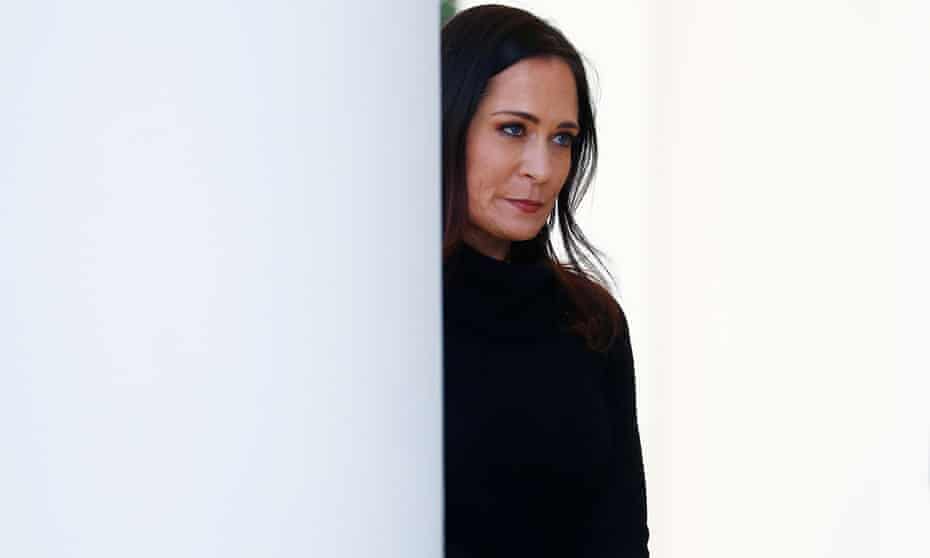
On Monday, Stephanie Grisham will appear on Good Morning America. ABC is billing the interview as the former White House press secretary’s chance to “break her silence”.
I’ll Take Your Questions Now review: Stephanie Grisham’s tawdry Trump tell-all
Donald Trump is unlikely to be watching. Grisham is not the first insider to break omertà on the Trumps, who rose from running a New York real estate empire to occupying the White House, but she may well be the politico who got closest of all.
A Republican operative before Trump seized the party, Grisham was spokeswoman and confidante to Melania Trump when she became first lady. Grisham shifted to the West Wing, becoming Trump’s third press secretary, then returned to the East Wing as Melania’s chief of staff. Shortly before the Trumps left the White House, on the day of the Capitol attack, she resigned.
Now she has written a book, I’ll Take Your Questions Now. The irony of the title has been widely noted. In nine months as press secretary, Grisham did not take questions at a single White House briefing. Nonetheless, the book has generated a slew of headlines, nearly all unflattering about her former bosses.
Stories range from the salacious, Trump calling a press aide forward on Air Force One in order to “look at her ass”, to the ludicrous, as when Trump and Boris Johnson used a G20 working breakfast to discuss the strength of kangaroos.
Grisham makes clear Trump’s unfitness to be president, whether due to his terrifying temper or his ridiculous demands – such as when, she says, he ordered her to finally go behind the White House podium, to defend him in his first impeachment by “acting out” his infamous phone call with the president of Ukraine.
Grisham avoided that humiliation, she writes, by getting “one of our most reliable ‘yes’ guys in the House”, Devin Nunes of California, to read the call into the congressional record. She also exposes decay higher up in the party. Lindsey Graham, the senator from South Carolina, is “gross and tacky … a snake”. Mitt Romney, Grisham’s former boss, a pillar of anti-Trump conservatives, is ridiculed for trying to become secretary of state.
Back down the food chain, Grisham does not name the White House aide with whom she had a relationship which ended in allegations of abuse, choosing to describe him as the “Music Man”, who she says could calm Trump down by playing his favourite songs, Memory from the musical Cats chief among them. The aide is widely known to be Max Miller, who denies Grisham’s allegations – and who is now a candidate for Congress in Ohio.
Trumpworld, of course, has lashed back. Peter Navarro, formerly a trade adviser and self-appointed White House enforcer, called Grisham’s book “useless gossip”. Trump claimed Grisham was being “paid by a radical left-leaning publisher to say bad and untrue things”.
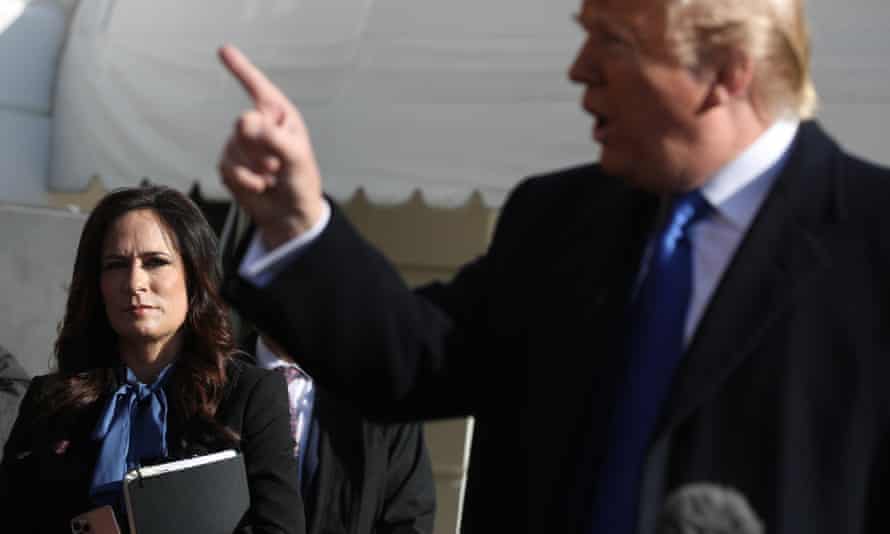
‘Dirty deeds’
Grisham resigned on 6 January, the day Trump supporters mounted a deadly attack on the US Capitol, seeking to overturn the election in support of his lies about voter fraud. She says she rejected the voter fraud argument. Politico has reported otherwise. In most eyes, either way, it was far too late to jump ship.
Eric Boehlert, founder of PressRun, a newsletter covering the US media, told the Guardian Grisham was “a legit inside source who had a position the whole time. So I think there’s a feeling like she was in the room. It’s not like hearsay.”
“[But] she’s sitting in meetings for years, writing notes to herself at night about how the president of the United States is a danger to the world and the danger to the country. If you’re gonna blow the whistle, have the courage to be a whistleblower. Don’t do it after everything is safe and he’s out of office.”
Some Trump aides who jumped or were pushed before Grisham have managed to stay in the media’s good graces, though obviously not the Trumps’.
Michael Cohen was Trump’s fixer before he flipped during the investigation of ties between Trump and Russia. He also went to prison, for crimes including lying to Congress and facilitating illegal payments to two women who alleged affairs with Trump.
Finishing his sentence in home confinement, he has become a vocal Trump critic through a book, Disloyal, a podcast, Mea Culpa, and as a voice on MSNBC. It’s quite a change for a man who once threatened journalists threatening to expose Trump’s “dirty deeds”.
John Bolton was Trump’s third national security adviser. A foreign policy hawk on the Republican right long before Trump, his time in the White House wasn’t a happy one, as Grisham recounts. Trump failed to stop publication of Bolton’s book, The Room Where It Happened, but Bolton managed to avoid testifying in Trump’s first impeachment trial. That and his presence as a media commentator, particularly over the withdrawal from Afghanistan, continues to anger many on the left.
Then there is Anthony Scaramucci, a Wall Street financier who spent 11 days as White House communications director. He stuck with Trump for a while, publishing a book in praise of the “Blue Collar President”, then broke with him. “The Mooch” retains a presence in national media.
Boehlert said: “I feel like these books are helpful in that they paint a first-hand portrait of a madman, period. And they’re helpful because they’re effective.”
But in Grisham’s case, he said, “it would have been helpful if [she] had warned us in 2017, 2018 … She had this perk job, she had access to the most elite circles on the planet. And she knew it was all wrong, and she knew it was dangerous. And now she’s cashing in on a book after Trump is in Mar-a-Lago.
“It’s not exactly a profile in courage.”
‘I looked totally incompetent’
As far as Trumpworld is concerned, Grisham’s chief crime may be to have betrayed her access, as chief of staff to Melania and press secretary to Donald, to some of the family’s most intimate moments.
In her book, she describes discovering “another piece of the puzzle that was the marriage of Donald and Melania Trump”. During a trip to France in summer 2017, she says, she stood “mostly alone” with the couple before a public engagement.
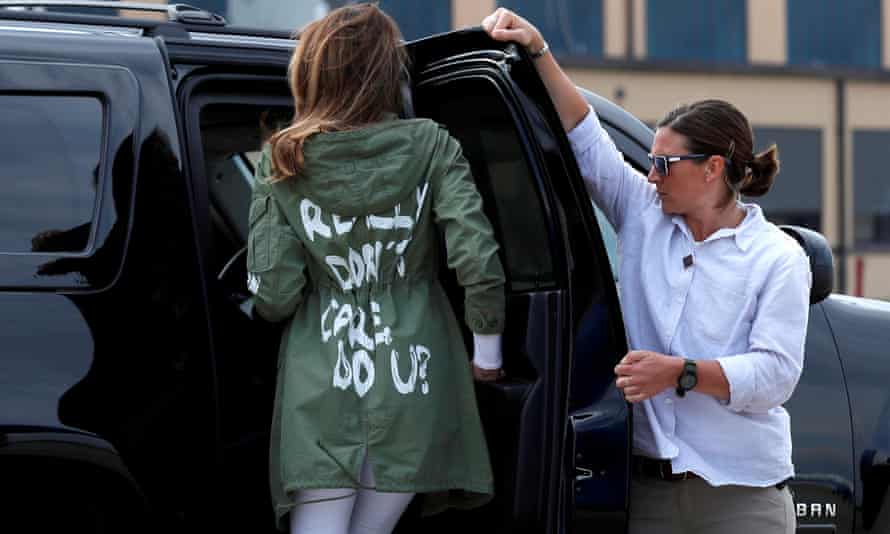
Former press secretary has decided to ‘break her silence’ but may find media less hospitable than to those who went before

Stephanie Grisham looks on at the White House, in November 2019.
Photograph: Tom Brenner/Reuter
Martin Pengelly
@MartinPengelly
Sun 3 Oct 2021
Martin Pengelly
@MartinPengelly
Sun 3 Oct 2021
On Monday, Stephanie Grisham will appear on Good Morning America. ABC is billing the interview as the former White House press secretary’s chance to “break her silence”.
I’ll Take Your Questions Now review: Stephanie Grisham’s tawdry Trump tell-all
Donald Trump is unlikely to be watching. Grisham is not the first insider to break omertà on the Trumps, who rose from running a New York real estate empire to occupying the White House, but she may well be the politico who got closest of all.
A Republican operative before Trump seized the party, Grisham was spokeswoman and confidante to Melania Trump when she became first lady. Grisham shifted to the West Wing, becoming Trump’s third press secretary, then returned to the East Wing as Melania’s chief of staff. Shortly before the Trumps left the White House, on the day of the Capitol attack, she resigned.
Now she has written a book, I’ll Take Your Questions Now. The irony of the title has been widely noted. In nine months as press secretary, Grisham did not take questions at a single White House briefing. Nonetheless, the book has generated a slew of headlines, nearly all unflattering about her former bosses.
Stories range from the salacious, Trump calling a press aide forward on Air Force One in order to “look at her ass”, to the ludicrous, as when Trump and Boris Johnson used a G20 working breakfast to discuss the strength of kangaroos.
Grisham makes clear Trump’s unfitness to be president, whether due to his terrifying temper or his ridiculous demands – such as when, she says, he ordered her to finally go behind the White House podium, to defend him in his first impeachment by “acting out” his infamous phone call with the president of Ukraine.
Grisham avoided that humiliation, she writes, by getting “one of our most reliable ‘yes’ guys in the House”, Devin Nunes of California, to read the call into the congressional record. She also exposes decay higher up in the party. Lindsey Graham, the senator from South Carolina, is “gross and tacky … a snake”. Mitt Romney, Grisham’s former boss, a pillar of anti-Trump conservatives, is ridiculed for trying to become secretary of state.
Back down the food chain, Grisham does not name the White House aide with whom she had a relationship which ended in allegations of abuse, choosing to describe him as the “Music Man”, who she says could calm Trump down by playing his favourite songs, Memory from the musical Cats chief among them. The aide is widely known to be Max Miller, who denies Grisham’s allegations – and who is now a candidate for Congress in Ohio.
Trumpworld, of course, has lashed back. Peter Navarro, formerly a trade adviser and self-appointed White House enforcer, called Grisham’s book “useless gossip”. Trump claimed Grisham was being “paid by a radical left-leaning publisher to say bad and untrue things”.

Grisham listens to Trump talk to reporters at the White House.
Photograph: Chip Somodevilla/Getty Images
Harper Collins – owned by Rupert Murdoch – will no doubt press ahead with its sales plan. But Grisham seems to have burned bridges with the mainstream media as well as her political party. Though the Washington Post and New York Times published detailed reports on her book, she seems unlikely to be welcomed into the fold as columnist or TV pundit.
Harper Collins – owned by Rupert Murdoch – will no doubt press ahead with its sales plan. But Grisham seems to have burned bridges with the mainstream media as well as her political party. Though the Washington Post and New York Times published detailed reports on her book, she seems unlikely to be welcomed into the fold as columnist or TV pundit.
‘Dirty deeds’
Grisham resigned on 6 January, the day Trump supporters mounted a deadly attack on the US Capitol, seeking to overturn the election in support of his lies about voter fraud. She says she rejected the voter fraud argument. Politico has reported otherwise. In most eyes, either way, it was far too late to jump ship.
Eric Boehlert, founder of PressRun, a newsletter covering the US media, told the Guardian Grisham was “a legit inside source who had a position the whole time. So I think there’s a feeling like she was in the room. It’s not like hearsay.”
“[But] she’s sitting in meetings for years, writing notes to herself at night about how the president of the United States is a danger to the world and the danger to the country. If you’re gonna blow the whistle, have the courage to be a whistleblower. Don’t do it after everything is safe and he’s out of office.”
Some Trump aides who jumped or were pushed before Grisham have managed to stay in the media’s good graces, though obviously not the Trumps’.
Michael Cohen was Trump’s fixer before he flipped during the investigation of ties between Trump and Russia. He also went to prison, for crimes including lying to Congress and facilitating illegal payments to two women who alleged affairs with Trump.
Finishing his sentence in home confinement, he has become a vocal Trump critic through a book, Disloyal, a podcast, Mea Culpa, and as a voice on MSNBC. It’s quite a change for a man who once threatened journalists threatening to expose Trump’s “dirty deeds”.
John Bolton was Trump’s third national security adviser. A foreign policy hawk on the Republican right long before Trump, his time in the White House wasn’t a happy one, as Grisham recounts. Trump failed to stop publication of Bolton’s book, The Room Where It Happened, but Bolton managed to avoid testifying in Trump’s first impeachment trial. That and his presence as a media commentator, particularly over the withdrawal from Afghanistan, continues to anger many on the left.
Then there is Anthony Scaramucci, a Wall Street financier who spent 11 days as White House communications director. He stuck with Trump for a while, publishing a book in praise of the “Blue Collar President”, then broke with him. “The Mooch” retains a presence in national media.
Boehlert said: “I feel like these books are helpful in that they paint a first-hand portrait of a madman, period. And they’re helpful because they’re effective.”
But in Grisham’s case, he said, “it would have been helpful if [she] had warned us in 2017, 2018 … She had this perk job, she had access to the most elite circles on the planet. And she knew it was all wrong, and she knew it was dangerous. And now she’s cashing in on a book after Trump is in Mar-a-Lago.
“It’s not exactly a profile in courage.”
‘I looked totally incompetent’
As far as Trumpworld is concerned, Grisham’s chief crime may be to have betrayed her access, as chief of staff to Melania and press secretary to Donald, to some of the family’s most intimate moments.
In her book, she describes discovering “another piece of the puzzle that was the marriage of Donald and Melania Trump”. During a trip to France in summer 2017, she says, she stood “mostly alone” with the couple before a public engagement.

Melania Trump climbs into her motorcade wearing the infamous Zara jacket, in Maryland in 2018.
Photograph: Kevin Lamarque/Reuters
Advertisement
“Mrs Trump … leaned into her husband, who whispered into her ear. A few moments later I saw them kiss each other. All of that was quite unusual; it was in fact the only time I ever saw them express any physical intimacy in public.”
Grisham says she was “so surprised I took a picture of the scene on my phone”. That picture, taken from behind, its subjects unsuspecting, is reproduced in Grisham’s book. It seems a startling breach of privacy and trust.
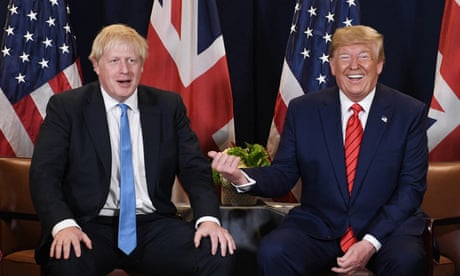
Stephanie Grisham book sheds light on Trump’s bizarre brushes with world leaders
Grisham also tells her version of a particularly furious media frenzy. On a trip to the southern border in June 2018 that included a visit to a detention centre for child migrants separated from their parents, Melania Trump wore a jacket which displayed a slogan: “I really don’t care. Do U?” Outrage was immediate and sustained.
Grisham blames Melania for going rogue, choosing her outfit while her closest aide was distracted. The first lady, she writes, “didn’t care about the media frenzy over her jacket, that’s for sure. Or at least she pretended not to care … But I did care, because it was my job, and, at best, I looked totally incompetent.”
Grisham now lives in Kansas, away from the Washington hullabaloo. Should she ever wish to dive back in, she may hope DC society at large responds as one White House predecessor did to her book.
Joe Lockhart, a press secretary under Bill Clinton, dismissed I’ll Take Your Questions Now in a mere five words.
“I don’t care,” he wrote. “Do you?”
Advertisement
“Mrs Trump … leaned into her husband, who whispered into her ear. A few moments later I saw them kiss each other. All of that was quite unusual; it was in fact the only time I ever saw them express any physical intimacy in public.”
Grisham says she was “so surprised I took a picture of the scene on my phone”. That picture, taken from behind, its subjects unsuspecting, is reproduced in Grisham’s book. It seems a startling breach of privacy and trust.

Stephanie Grisham book sheds light on Trump’s bizarre brushes with world leaders
Grisham also tells her version of a particularly furious media frenzy. On a trip to the southern border in June 2018 that included a visit to a detention centre for child migrants separated from their parents, Melania Trump wore a jacket which displayed a slogan: “I really don’t care. Do U?” Outrage was immediate and sustained.
Grisham blames Melania for going rogue, choosing her outfit while her closest aide was distracted. The first lady, she writes, “didn’t care about the media frenzy over her jacket, that’s for sure. Or at least she pretended not to care … But I did care, because it was my job, and, at best, I looked totally incompetent.”
Grisham now lives in Kansas, away from the Washington hullabaloo. Should she ever wish to dive back in, she may hope DC society at large responds as one White House predecessor did to her book.
Joe Lockhart, a press secretary under Bill Clinton, dismissed I’ll Take Your Questions Now in a mere five words.
“I don’t care,” he wrote. “Do you?”
No comments:
Post a Comment